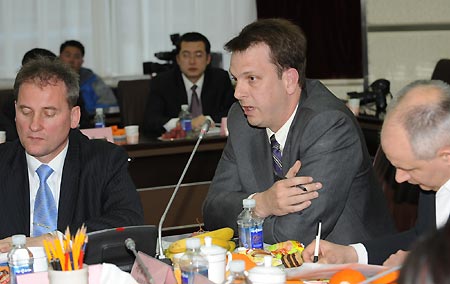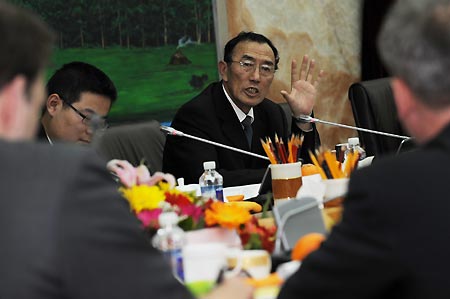Foreign diplomats visit Lhasa after March 14 riot
(Xinhua)
Updated: 2008-03-30 08:59
Updated: 2008-03-30 08:59
Qiangba Puncog met with the delegation Friday evening.
 Slovenian Counsellor to China Bernard Srajner takes a photo of a damaged ambulance at a hospital in Lhasa, capital of southwest China's Tibet Autonomous Region, March 29, 2008. [Xinhua]
|
He told the diplomats that the March 14 violent incidents were created by the "Tibet independence" forces and organized, premeditated and masterminded by the current Dalai clique with the vicious intention of undermining the upcoming Beijing Olympics and splitting Tibet from the motherland.
He said police authorities had detained 414 suspects being involved in the beating, smashing, ransacking and arson incidents, and another 289 turned themselves in. Among them, 111 had been released for minor offence.
The Public Security Bureau of Lhasa had issued a "most wanted" list hunting for 53 suspects and post their images on major Internet portals, including yahoo.com and sina.com. Among the 53 suspects, six had turned themselves in, and four had been arrested, Qiangba Puncog said.
So far, at least 18 civilians, including an eight-month infant, and one police officer had been confirmed killed in the Lhasa unrest, which also saw 382 injuries. Damage was estimated at about 250 million yuan (35.21 million U.S. dollars), according to the regional government chairman, adding that no foreigners had been hurt in the unrest.
 Gregory C.May (C), a US diplomat to China, asks a question during a meeting with Qiangba Puncog, chairman of the Tibet regional government, in Lhasa, capital of southwest China's Tibet Autonomous Region, March 29, 2008. [Xinhua]
|
Oswaldo Biato Jr, minister counselor of Brazilian Embassy in China and head of the delegation, expressed his gratitude to Qiangba Puncog for his meeting.
He said all the delegates were glad to be here, as it was a good chance to collect first-hand information.
During his meeting with the delegation, Qiangba Puncog also urged Tibetan monks to stay out of politics, saying, "Politics is not in line with Buddhism doctrines."
Counsellor of the Slovenian Embassy in China Bernard Srajner said he was satisfied at Qiangba Puncog's remarks. What he saw after arriving Lhasa showed that "it is a normal city."
 Qiangba Puncog, chairman of the Tibet regional government, talks to the visiting diplomats during a meeting in Lhasa, capital of southwest China's Tibet Autonomous Region, March 29, 2008. [Xinhua]
|
Gregory May, secondary secretary from the United States Embassy in China, called the trip "a step in the right direction."
On Saturday morning, the delegation visited wounded police and other patients at local hospitals.
The diplomats also talked with ordinary Tibetans whose lives have been severely affected by the March 14 riot, as well as some foreigners who live in Lhasa.
The diplomats returned to Beijing late Saturday evening.
The trip was arranged by China's Foreign Ministry and the government of the Tibet Autonomous Region.
|
||
|
||
|
|
|
|

